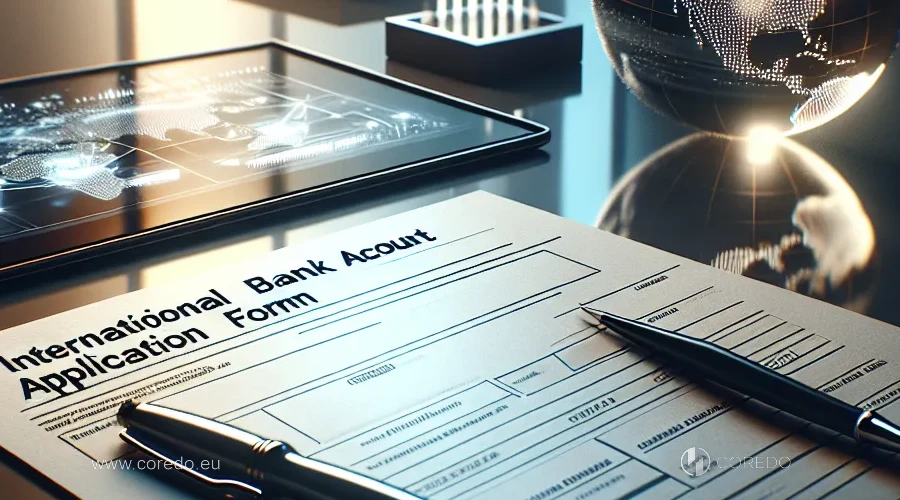“`html
Introduction: Why It Is Important to Open a Bank Account Abroad for an International Company

Did you know that more than 60% of international companies face rejection on their first attempt to open a corporate account abroad? And this is not just bureaucracy; behind every rejection is a complex system of compliance checks, changing regulatory requirements, and increasing de-risking risks. Today, as business seeks globalization, opening a bank account for an international company is not just a formality, but a strategic step that determines scalability, financial flexibility, and business resilience.
Why are entrepreneurs from Europe, Asia, and the CIS increasingly choosing foreign banks? Because a corporate account abroad is not only access to multi-currency operations and international payments but also a tool for tax optimization, asset protection, and entering new markets. However, the path to such an account is fraught with pitfalls: from choosing a jurisdiction and bank to undergoing strict AML/KYC procedures and confirming economic substance.
If you are a business owner or manager planning to go beyond your home jurisdiction, this article is your practical guide. There are no common phrases or template advice here. Only specifics, verified cases from the COREDO team, and step-by-step instructions to help you not only open an account but do it as efficiently as possible, taking into account the latest trends of 2025.
Opening a Bank Account Abroad: Strategic Advantages for International Business

What Tasks Does a Corporate Account Abroad Solve?
A corporate account in a foreign bank is not just a “wallet” for international payments. It is a key element of corporate structuring that allows:
- Conducting multi-currency transactions without losses on conversion and currency control.
- Optimizing taxation by choosing a jurisdiction with a favorable tax regime and participating in international agreements (CRS, FATCA, BEPS).
- Increasing partner trust: an account in a respectable bank in the EU, Asia, or the Middle East enhances the company’s image.
- Streamlining the management of holding structures: centralizing group finances, minimizing transaction costs.
- Gaining access to modern financial services – corporate cards, payment gateways, integration with ERP systems, automation of cash management.
When and Who Needs an Account in a Foreign Bank
A corporate account abroad is not necessary for everyone, but there are situations when it is indispensable:
- International expansion: entering new markets, opening branches, working with foreign clients and suppliers.
- Tax burden optimization: using double taxation avoidance agreements, participating in IP-box and other preferential regimes.
- Asset protection, diversification of banking risks, minimizing the impact of local crises.
- Working with cryptocurrency, fintech, payment systems: many traditional banks do not work with such businesses, while specialized jurisdictions (Malta, Estonia, Singapore) offer licensed solutions.
- Complex ownership structure – holdings, SPVs, trusts require transparent banking support.
Requirements for Opening an Account in a Foreign Bank: What to Know in 2025

Documents for Opening an Account for a Legal Entity
The standard document package includes:
- Incorporation documents: charter, certificate of registration, extract from the register (Certificate of Incorporation, Articles of Association, Certificate of Good Standing).
- Documents of beneficiaries and directors – passports, address verification, resumes, sometimes, recommendation letters.
- Business plan and proof of business reality – contracts, invoices, website, social media, business model description.
- Financial statements, balance sheet, income statement, tax returns.
- Legal address and substance requirements: confirmation of the presence of an office, employees, operational activity in the chosen jurisdiction.
Beneficiary Verification and KYC: Modern Bank Requirements
Economic Substance and Substance Requirements
The requirements for economic presence (substance requirements) are tightening worldwide. Banks and regulators want to see a real business: office, employees, operations, tax residency. “Paper” companies without substance face refusals or account blocks.
Step-by-Step Guide: How to Open a Corporate Account Abroad

Choosing a Jurisdiction and Bank for an International Company
Choosing a jurisdiction: the first and most important step. You need to consider:
- Country and bank reputation: affects partners’ trust and access to financing.
- Substance requirements, where it is easier to confirm the reality of the business.
- Tax regime – rates, double taxation avoidance agreements, CRS/FATCA participation.
- Loyalty to non-residents: in which countries it is easier to open an account for foreign owners.
- Licenses available for fintech, crypto, payment services.
Preparation and Submission of Documents: Nuances for the EU, Asia, Africa
The account opening process usually includes:
- Selecting a bank and preliminary screening: evaluating the chances of success, preparing pre-approval.
- Collecting and preparing documents: translation, apostille, notarization, preparation of explanatory letters.
- Submitting the application, online or through a registration agent.
- Undergoing an interview – in person or via video call, questions about the business, sources of funds, plans.
- Making the minimum deposit – from $1,000 to $50,000 depending on the bank and country.
- Account activation and service connection – internet banking, corporate cards, API integration.
Passing Compliance Checks and AML Business Support
- Sources of funds – the origin of capital, the legality of operations.
- Business model – compliance with the declared activity, money laundering risks.
- Ownership structure – transparency, absence of PEP (politically exposed persons), sanctions risks.
- Transaction history: if the company was already operating, the bank will request statements from old accounts.
Remote Account Opening for Legal Entities: Pros and Cons
Remote account opening is a trend in recent years. Many banks and EMIs (electronic money institutions) offer a fully remote process with e-KYC and digital signature.
Main Risks and Challenges of Opening an Account in a Foreign Bank

Reasons for Refusal and How to Minimize Them
- Opaque ownership structure – complex schemes, nominees, offshore.
- Lack of substance: “paper” company without real activity.
- Reputational risks – links with sanctioned individuals, countries, sectors.
- Insufficient documentation, lack of contracts, reporting, address confirmation.
- High-risk business model – crypto, gambling, adult, without a license.
How to minimize the risks:
- Prepare a complete set of documents: the more detailed, the better.
- Work out the ownership structure: minimal intermediaries, maximum transparency.
- Confirm the reality of the business – website, social media, contracts, payments.
- Bring in a professional consultant to prepare for due diligence and support at all stages.
Specifics for Offshore and Onshore Companies
Transaction Limits and Currency Control
- Operational limits, by amount, currency, payment purpose.
- Transaction monitoring, banks automatically track suspicious transactions, and may request explanations.
- Currency control – in some countries (e.g., China, India) there are strict controls on capital withdrawal.
- Fees – for opening, maintenance, transfers, conversion. For non-residents, tariffs are often higher.
Comparison of Popular Jurisdictions and Banks for Opening a Corporate Account
Table Comparing Account Opening Conditions in the EU, Asia, Africa
| Jurisdiction | Opening Timeframes | Substance Requirements | Minimum Deposit | Loyalty to Non-Residents | Compliance Features |
|---|---|---|---|---|---|
| Germany | 2-4 weeks | High | €10,000 | Medium | Strict AML/KYC, interview |
| Singapore | 1-3 weeks | Medium | $5,000 | High | Fast e-KYC, local director |
| UAE (Dubai) | 1-2 weeks | Medium | $10,000 | High | Flexible requirements, no tax |
| Hong Kong | 2-6 weeks | High | $1,000 | Medium | Careful due diligence |
| Cyprus | 1-2 weeks | Medium | €1,000 | High | Lenient compliance, EU standards |
Alternatives to Traditional Banks: EMI, PSP, Fintech Solutions
- Fast account opening: sometimes in 1-2 days.
- Flexible fees – lower fees, multi-currency options.
- Integration with payment systems: acquiring, gateways, API.
- Specialization for niche businesses, crypto, SaaS, marketplaces.
Practical Steps and Recommendations for Successful Account Opening
How to Prepare Your Business and Documents for Due Diligence
- Gather a complete set of corporate documents, charter, protocols, certificates, extracts.
- Prepare proof of business reality, contracts, invoices, website, social media.
- Work out the ownership structure, minimize chains, ensure transparency of beneficiaries.
- Prepare financial statements, balance sheet, P&L, tax returns.
- Ensure substance, office, employees, operations in the chosen jurisdiction.
- Conduct preliminary screening: check founders and beneficiaries against sanctions lists, PEP databases.
Selecting a Consulting Partner and Legal Support
Opening an account abroad is a complex process where every detail matters. Professional support is not a luxury but a necessity. The COREDO team offers:
- Business model analysis and jurisdiction selection: considering tax, regulatory, and reputational risks.
- Document preparation and due diligence passage: from document collection to bank interviews.
- AML support and compliance: assistance with building internal processes, staff training.
- Turnkey account opening, from bank selection to connecting all services.
- Post-opening support – assistance with reporting, audit, operation optimization.
Key Takeaways and Actionable Advice for Entrepreneurs
Opening a bank account abroad for an international company in 2025 is an achievable task, but it requires deep expertise, preparation, and a strategic approach.
Here are the key recommendations that the COREDO team gives to its clients:
- Choose your jurisdiction wisely: don’t chase “cheapness”, assess reputation, substance requirements, tax implications.
- Prepare for due diligence: transparency, documentation, proof of business reality do more than connections or intermediaries.
- Do not skimp on professional support – mistakes at the account opening stage can cost months of waiting and thousands of euros in lost profit.
- Build long-term relationships with the bank – regular operations, reporting, AML compliance reduce the risk of account blocking.
- Consider alternatives to traditional banks – EMI, PSP, fintech solutions may be optimal for niche businesses.
- Plan for structural development – as the business grows, possible transition to more reputable jurisdictions, opening accounts in multiple countries, optimizing taxes and cash flow.
“`